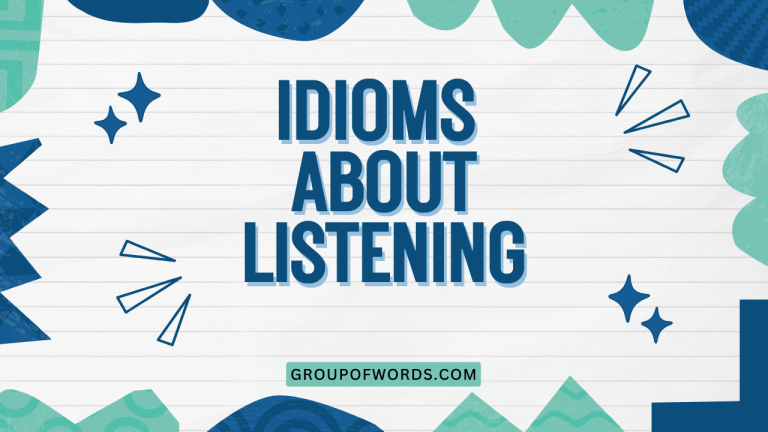Age-Old Wisdom: Mastering Idioms About Age in English
Idioms are the colorful building blocks of language, adding depth and nuance to our communication. Among the most relatable and frequently used are those that revolve around the concept of age.
Understanding idioms about age is crucial for English language learners as they provide insights into cultural perspectives, enhance comprehension of spoken and written English, and allow for more expressive and natural communication. This article will explore a wide range of age-related idioms, providing definitions, examples, and practical exercises to help you master their usage.
Whether you’re a beginner or an advanced learner, this guide will equip you with the knowledge to confidently incorporate these idioms into your everyday English.
Table of Contents
- Introduction
- Definition of Idioms About Age
- Structural Breakdown
- Types and Categories of Idioms About Age
- Examples of Idioms About Age
- Usage Rules for Idioms About Age
- Common Mistakes When Using Idioms About Age
- Practice Exercises
- Advanced Topics
- Frequently Asked Questions
- Conclusion
Definition of Idioms About Age
Idioms are expressions whose meanings cannot be understood from the literal meanings of the individual words. Instead, they have a figurative meaning that is culturally specific.
Idioms about age are phrases that use the concept of age, or stages of life, to convey a particular idea, feeling, or situation. These idioms often reflect societal attitudes, experiences, and perceptions associated with different age groups.
Idioms about age can be classified based on the stage of life they refer to: youth, middle age, or old age. They can also be categorized by the type of meaning they convey, such as wisdom, inexperience, decline, or maturity.
Understanding the context in which these idioms are used is crucial for accurate interpretation.
Structural Breakdown
The structure of age-related idioms varies widely. Some idioms are simple phrases, while others are more complex clauses.
The core element is usually a word or phrase that directly or indirectly relates to age. For instance, the word “old” appears in many idioms related to experience or obsolescence.
The structural components can include:
- Nouns: Spring chicken (referring to youth).
- Adjectives: Old hat (referring to something outdated).
- Verbs: Act your age (referring to behaving appropriately for one’s age).
- Prepositional phrases: Over the hill (referring to being past one’s prime).
The meaning of the idiom is derived from the combination of these elements and their figurative interpretation within a specific cultural context. It’s important to note that the grammatical structure alone is not sufficient to understand the idiom; the meaning is often deeply rooted in cultural understanding and shared experiences.
Types and Categories of Idioms About Age
Idioms about age can be broadly categorized based on the life stage they relate to. This classification helps in understanding the nuances and connotations associated with each idiom.
Idioms Related to Youth
These idioms often refer to inexperience, naiveté, or the energy and vitality associated with being young. They can also highlight the potential and opportunities that lie ahead.
Idioms Related to Middle Age
Idioms in this category often touch on themes of responsibility, experience, and the realization of one’s potential. They may also reflect on the challenges and transitions that come with this stage of life.
Idioms Related to Old Age
These idioms frequently discuss wisdom, experience, and the physical or mental decline that can occur with age. They can also express respect for elders or highlight the value of life lived.
General Age-Related Idioms
This category includes idioms that refer to age in a general sense, without being specific to a particular life stage. They can relate to the concept of aging, maturity, or the passage of time.
Examples of Idioms About Age
Understanding idioms requires seeing them in context. The following sections provide extensive examples of age-related idioms, categorized by the life stage they represent.
Each example includes the idiom, its meaning, and a sentence demonstrating its use.
Examples of Idioms Related to Youth
These idioms capture the essence of youth, from its boundless energy to its occasional naiveté. They often paint a vivid picture of the experiences and perspectives unique to this stage of life.
The table below presents a comprehensive list of idioms related to youth, their meanings, and illustrative examples.
| Idiom | Meaning | Example |
|---|---|---|
| Wet behind the ears | Inexperienced and naive. | He’s still wet behind the ears, so don’t expect him to know all the answers. |
| Greenhorn | A newcomer or someone inexperienced. | As a greenhorn in the industry, she had a lot to learn. |
| Young blood | New and energetic people. | The company needs some young blood to bring fresh ideas. |
| Spring chicken | A young person. | She’s no spring chicken, but she’s still very active. |
| In one’s salad days | A time of youthful inexperience and enthusiasm. | He reminisced about his salad days, when he was full of dreams. |
| Still cutting your teeth | Still new and inexperienced. | He’s still cutting his teeth in the business world. |
| Not dry behind the ears | Very young and inexperienced. | She’s not dry behind the ears yet, so give her some time to learn. |
| A babe in the woods | Naive and innocent, especially in a dangerous or complex situation. | He was a babe in the woods when he first arrived in the city. |
| In the bloom of youth | In the prime of youth; at one’s most beautiful and energetic. | She was in the bloom of youth when they met. |
| Full of vim and vigor | Full of energy and enthusiasm. | The children were full of vim and vigor as they played in the park. |
| At a tender age | Very young. | He started playing the piano at a tender age. |
| In your youth | During the time when you were young. | In your youth, you could run faster than anyone else. |
| To be knee-high to a grasshopper | Very young and small. | I remember when he was knee-high to a grasshopper. |
| To be in diapers | To be very young; an infant. | That technology was still in diapers when I started my career. |
| New kid on the block | Someone new to a place or organization. | As the new kid on the block, he was eager to make a good impression. |
| Fresh face | A new and often younger person in a group. | The team needed a fresh face to bring in new ideas. |
| Green around the gills | Looking pale and sickly, often due to inexperience or nervousness. | He looked green around the gills before his first presentation. |
| Young at heart | Having a youthful spirit, regardless of age. | My grandmother is 80, but she’s still young at heart. |
| Born yesterday | Naïve; easily deceived. | I wasn’t born yesterday; I know what you’re trying to do. |
| A whippersnapper | A young and often cheeky person. | That whippersnapper thinks he knows everything! |
| Coming of age | The transition from childhood to adulthood. | The movie is a story about coming of age. |
| In its infancy | In its early stages of development. | The technology is still in its infancy. |
| Still wet behind the ears | Young and inexperienced. | He is still wet behind the ears, so he needs guidance. |
Examples of Idioms Related to Middle Age
Middle age idioms often reflect the responsibilities, experiences, and sometimes the crises associated with this life stage. They can also convey a sense of established status or the realization of long-term goals.
The following table provides idioms commonly used to describe middle age, along with their meanings and example sentences.
| Idiom | Meaning | Example |
|---|---|---|
| Over the hill | Past one’s prime; too old to be effective. | He’s not over the hill yet; he still has a lot to offer. |
| Middle-aged spread | The weight gain that often occurs in middle age. | He’s starting to develop a bit of a middle-aged spread. |
| Getting on | Getting older. | She’s getting on a bit, but she’s still very active. |
| No spring chicken | Not young anymore. | I’m no spring chicken, but I can still keep up with the younger ones. |
| In the prime of life | At the best and most productive stage of life. | He was in the prime of life when he started his own business. |
| In one’s golden years | The later years of life, typically after retirement. | They were enjoying their golden years, traveling the world. |
| Seasoned professional | Experienced and knowledgeable. | As a seasoned professional, she knew how to handle the situation. |
| Been around the block | Experienced and worldly-wise. | He’s been around the block and knows how things work. |
| Old hand | An experienced person. | She’s an old hand at managing these projects. |
| At the crossroads | At a point where a decision needs to be made that will have significant consequences. | He felt like he was at the crossroads in his career. |
| Midlife crisis | A period of uncertainty and dissatisfaction occurring in middle age. | He bought a sports car, probably going through a midlife crisis. |
| Over the wrong side of (age) | Older than a particular age. | She’s over the wrong side of 40, but she looks great. |
| Sowing wild oats | Enjoying youthful pleasures and freedom before settling down. | He sowed his wild oats in his twenties and then got serious about his career. |
| Pastures new | A new job or situation. | He decided to seek pastures new after 20 years with the company. |
| Long in the tooth | Getting old. | He’s getting a bit long in the tooth to be playing professional sports. |
| Getting on in years | Becoming old. | My grandfather is getting on in years, but he still enjoys gardening. |
Examples of Idioms Related to Old Age
These idioms often reflect the wisdom accumulated over a lifetime, as well as the physical changes and societal perceptions associated with growing old. They can be both respectful and humorous.
The table below lists idioms related to old age, their meanings, and example sentences.
| Idiom | Meaning | Example |
|---|---|---|
| Golden years | The later years of life, typically after retirement. | They spent their golden years traveling the world. |
| Long in the tooth | Old; elderly. | He’s getting a bit long in the tooth to be playing professional sports. |
| Over the hill | Past one’s prime; too old to be effective. | Some people think he’s over the hill, but he still has a lot to offer. |
| Getting on in years | Becoming old. | My grandfather is getting on in years, but he still enjoys gardening. |
| Old as the hills | Very old. | That joke is old as the hills. |
| Fossil | An old person, often someone resistant to change. | Some people see him as a fossil because he sticks to traditional methods. |
| Old-timer | An elderly person, often with a lot of experience. | The old-timers at the club have seen a lot of changes over the years. |
| Past their sell-by date | Too old to be useful or effective. | Some technologies are past their sell-by date and need to be replaced. |
| One foot in the grave | Near death; very old and frail. | He’s got one foot in the grave, but he’s still full of life. |
| Silver surfer | An older person who uses the internet. | More and more silver surfers are joining online communities. |
| Set in their ways | Unwilling to change their habits or opinions. | Older people are often set in their ways. |
| In your dotage | In a period of old age when someone is weak and confused. | He was in his dotage when he wrote his last book. |
| An old head on young shoulders | A young person who thinks and acts like an older, more experienced person. | She’s an old head on young shoulders and gives great advice. |
Examples of General Age-Related Idioms
These idioms refer to age in a broader sense, encompassing the entire lifespan or specific qualities associated with different age groups. They can be used to describe maturity, experience, or the effects of time.
The following table includes general age-related idioms, their meanings, and example sentences.
| Idiom | Meaning | Example |
|---|---|---|
| Act your age | Behave in a manner appropriate for your age. | Stop being silly and act your age! |
| Age is just a number | Age is not important; what matters is how you feel and act. | She believes that age is just a number and lives life to the fullest. |
| Of age | Having reached the legal age for adulthood. | He is now of age and can vote. |
| Underage | Below the legal age. | It’s illegal to serve alcohol to underage drinkers. |
| Old hat | Outdated; no longer fashionable or interesting. | That style of music is old hat these days. |
| A chip off the old block | Someone who is similar to their parent in character or behavior. | He’s a chip off the old block, just like his father. |
| An old flame | A former lover. | She ran into an old flame at the party. |
| Old wives’ tale | A traditional belief or superstition that is not based on scientific evidence. | Don’t believe that old wives’ tale about catching a cold from being outside. |
| As old as time | Very old; timeless. | The story of good versus evil is as old as time. |
| Advanced in years | Old; elderly. | He was advanced in years but still very sharp. |
| Growing older but not up | Remaining immature despite getting older. | He’s growing older but not up, still acting like a child. |
| Like father, like son | Sons tend to do what their fathers did before them. | He became a doctor, like father, like son. |
| At the grand old age of… | Used to express surprise that someone has reached a particular age. | She climbed Mount Everest at the grand old age of 70. |
Usage Rules for Idioms About Age
Using idioms correctly requires understanding their specific meaning and context. Here are some key rules to follow when using idioms about age:
- Context is key: Always consider the situation and the audience. Some idioms may be inappropriate in formal settings.
- Figurative meaning: Remember that idioms have a figurative, not literal, meaning. Don’t try to interpret them word-for-word.
- Cultural sensitivity: Be aware that some idioms may have different connotations in different cultures.
- Correct tense: Use the correct verb tense when incorporating idioms into sentences. For example, “He’s getting on a bit” (present continuous) rather than “He get on a bit.”
- Proper word order: Idioms often have a fixed word order. Changing the order can alter the meaning or make the idiom nonsensical.
Common Mistakes When Using Idioms About Age
Learners often make mistakes when using idioms due to their non-literal nature. Here are some common errors to avoid:
| Incorrect | Correct | Explanation |
|---|---|---|
| He is wet behind the ears literally. | He is wet behind the ears. | Avoid literal interpretations. |
| She said age is only a number. | She said age is just a number. | Use the correct wording of the idiom. |
| He acted his age. | He acted his age. | The idiom requires the possessive pronoun. |
| They are in their gold years. | They are in their golden years. | Ensure the correct adjective form is used. |
Practice Exercises
Test your understanding of idioms about age with these exercises. Each exercise focuses on a different aspect of idiom usage.
Exercise 1: Matching
Match the idiom with its correct meaning.
| Idiom | Meaning |
|---|---|
| 1. Wet behind the ears | A. Past one’s prime |
| 2. Over the hill | B. Very old |
| 3. Old as the hills | C. Inexperienced |
| 4. Act your age | D. Behave appropriately |
| 5. Golden years | E. Retirement years |
Answers: 1-C, 2-A, 3-B, 4-D, 5-E
Exercise 2: Fill in the Blanks
Complete the sentences with the correct idiom from the list below.
Idiom List: a chip off the old block, old hat, long in the tooth, age is just a number, middle-aged spread
| Question | Answer |
|---|---|
| 1. He’s getting a bit of a __________, but he doesn’t seem to mind. | middle-aged spread |
| 2. That style of clothing is __________. Nobody wears it anymore. | old hat |
| 3. He’s __________ to be playing professional sports. | long in the tooth |
| 4. She’s just like her mother; she’s __________. | a chip off the old block |
| 5. She believes that __________ and continues to pursue her dreams. | age is just a number |
Exercise 3: Sentence Completion
Complete the following sentences using an appropriate idiom about age.
| Question | Answer |
|---|---|
| 1. He may be young, but he is __________, always offering wise advice. | an old head on young shoulders |
| 2. After working for 40 years, she was looking forward to her __________. | golden years |
| 3. He needs to ___________ and stop behaving like a child. | act his age |
| 4. She’s __________ and very inexperienced, so be patient with her. | wet behind the ears |
| 5. Don’t tell me that ridiculous story; it’s __________. | old as the hills |
Advanced Topics
For advanced learners, exploring the etymology and cultural context of idioms about age can provide deeper insights. Researching how these idioms have evolved over time and how they are used in literature and media can further enhance understanding and appreciation.
Additionally, comparing age-related idioms across different languages can reveal interesting cultural differences in perceptions of aging.
Another advanced topic involves analyzing the rhetorical effect of using idioms about age. Consider how these idioms can be used to create humor, express empathy, or convey a particular viewpoint.
Understanding the subtle nuances of idiom usage can significantly improve communication skills and cultural competence.
Frequently Asked Questions
Here are some frequently asked questions about idioms about age:
- What are idioms, and why are they important?
Idioms are expressions whose meanings cannot be derived from the literal definitions of the words they contain. They are important because they add color and depth to language, reflect cultural values, and are commonly used in everyday communication. Understanding idioms is crucial for comprehending spoken and written English and for communicating effectively.
- How can I learn idioms effectively?
Learning idioms effectively involves several strategies: exposure through reading and listening, memorization with context, practice using idioms in conversation and writing, and looking up unfamiliar idioms when encountered. Flashcards, online resources, and language exchange partners can also be helpful tools.
- Are idioms the same in all cultures?
No, idioms are culturally specific. What might be a common idiom in one culture could be completely nonsensical or have a different meaning in another. It’s important to be aware of cultural differences when using idioms to avoid miscommunication or offense.
- How do I know when to use an idiom?
Use idioms when they fit the context and tone of the conversation or writing. Consider your audience and the level of formality required. Avoid using idioms excessively or inappropriately, as this can make your communication sound unnatural or confusing.
- What is the difference between an idiom and a proverb?
An idiom is a phrase with a figurative meaning, while a proverb is a short, wise saying that offers advice or expresses a general truth. Idioms focus on expression, while proverbs focus on imparting wisdom or guidance.
- Can I create my own idioms?
While you can be creative with language, idioms are generally established expressions that are widely recognized and understood within a culture. Creating your own idioms is unlikely to be effective unless they catch on and become part of common usage.
- How do I avoid misusing idioms?
To avoid misusing idioms, always check their meaning and context before using them. Pay attention to the correct wording and grammatical structure. Practice using idioms in different situations and ask for feedback from native speakers.
- Are there resources available to help me learn idioms?
Yes, there are many resources available, including dictionaries of idioms, online idiom websites, language learning apps, and textbooks. Additionally, engaging with authentic English content, such as movies, TV shows, and books, can expose you to idioms in context.
Conclusion
Mastering idioms about age is a valuable step in achieving fluency and cultural competence in English. By understanding the definitions, structural elements, and usage rules of these idioms, learners can enhance their comprehension, express themselves more effectively, and avoid common mistakes.
Remember to practice regularly, pay attention to context, and be mindful of cultural nuances. With dedication and the resources provided in this article, you can confidently incorporate age-related idioms into your everyday English and communicate with greater clarity and impact.
Continue practicing and exploring new idioms to enrich your vocabulary and deepen your understanding of the English language. The journey of language learning is ongoing, and mastering idioms is a rewarding part of that process.
Good luck, and keep learning!






